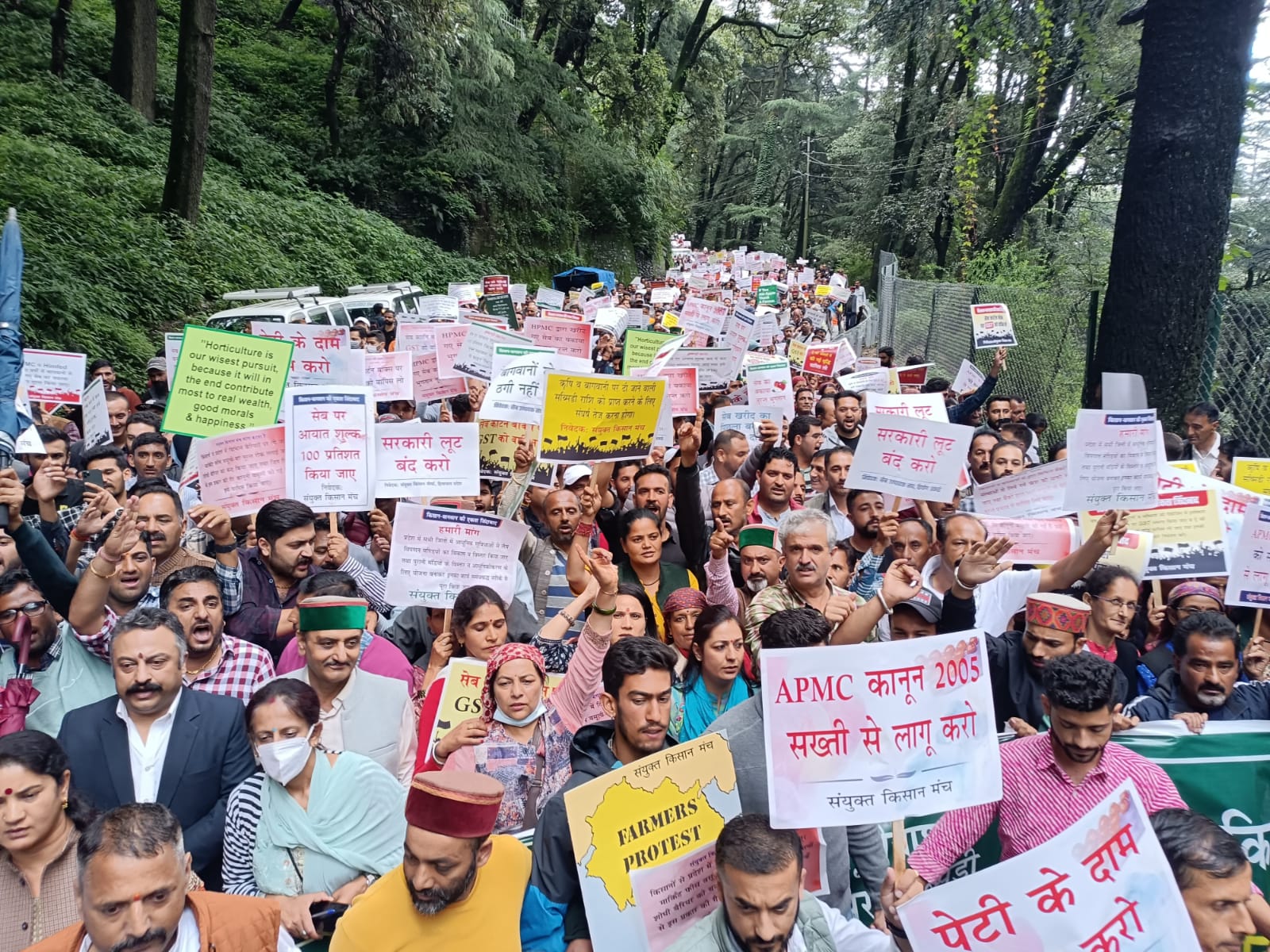
Believed to have played a crucial role in dethroning of the Jai Ram government, the apple growers who are apparently under distress due to steep rise in inputs costs and other market factors, are pinning hopes on newly installed Congress government, reports Rajesh Moudgil
The recently held assembly poll results in Himachal Pradesh have two bitter takeaways for the ousted Bharatiya Janata Party (BJP) – aside from government employees’ demand for old pension scheme, Jai Ram Thakur-led BJP government also did not take apple growers’ demands for relief from various factors affecting the trade, seriously. Hence, the drubbing in the polls.
The apple trade, which contributes around 13.5% of the state’s gross domestic product (GDP) of around Rs 6,000 crore, engages more than 1.7 lakh families in the hilly state.
Stressed due to the consistent poor returns, the apple farmers had also repeatedly staged demonstrations at the state secretariat under the aegis of Himachal Kisan Manch a few months ago.
The 20-point demand charter given to the state by apple growers included many issues.
The main among them included restoration of subsidies on inputs on pesticides, fertilizers, implements, exempt GST of 18% on packing material, removal of all unhealthy marketing practices in state-owned marketing board followed through marketing committees, public sector procurement agencies and the private marketing players, introduction of the Market Intervention Scheme (MIS) on grading basis, implement insurance back-up in case of crop losses of apples due to inclement weather, transportation and marketing, increase in infrastructure like cold-storage and processing units from strategic points to apex levels, facilitating the exports removing to some constraints in quality standards, enhancement in the import duty to 100% from 70%, support to growers to enhance productivity of apples per unit area, and establishing the state Horticulture Board and Commission.
The Bitter Dose
Since the BJP apparently failed to give a timely and satisfactory response to the anguished apple farmers, the apple farmers gave a bitter dose to its candidates as was evident from the poll results.
Spread in about 20 assembly seats in Kinnaur, Shimla, Mandi and Kullu districts, it is the apple belt that significantly influences the political contours of the state.
Sample this: In 2012, the Congress won six seats out of eight seats in the Shimla district and four in 2017, when the BJP came to power in the state, while Theog seat went to CPI-M leader Rakesh Singha.
This time, the Congress won 12 of the said 17 assembly seats which include seven seats out of total eight in Shimla; likewise, the other apple growing belt Kinnaur gave it one and Mandi and Kullu belts, two each.
The former CPI-M MLA from Theog and a farmers’ leader, Rakesh Singha, rues, what he terms as, the neo-liberal path of development which was resulting in apple cultivation becoming a loss making concern to the farmers as the state has withdrawn itself from state investments resulting in the cost of production to increase sharply and the returns have fallen sharply.
He opined that under such circumstances, broad-based farmers’ organisation would have to be built which had the capacity to get the government to provide assistance to the farmers in terms of subsidies at all levels from plantation to post harvesting storage facilities. No government in the present scenario would concede to the farmers unless they were able to build struggles as only guarantee for reversal of the “such a development’’, he added.
Singha also held that the commission agents violated the Himachal Pradesh agricultural and horticultural produce marketing (development and regulation) Act 2005 which needed to be enforced by the state machinery. “Crores of rupees are pending with the commission agents of the farmers which need to be provided to the farmers through the state intervention’’. This is one major issue that needs to be addressed.
Looking Ahead
Congress’ legislator from Kasumpti, district Shimla, Anirudh Singh, a three-time MLA and former Shimla Zila Parishad chairman, highlights the plight of apple growers of the state.
“Apple growers of the state who often bear the brunt due to the global warming – which adversely hit the fruits’ production – and the steep increase in the input costs in the recent years got a crippling jolt when the BJP government stopped the subsidies’’, Singh said and added that the woes of the apple growers further increased in the wake of spiralling prices of fertilisers, labour and packing costs.
Stating that the state’s apple farmers have also been struggling to cope up with the stiff competition with the corporate giants who have huge apple storing capacity, Singh said that the Congress government is planning to give subsidies to the apple growers as well as making fertilizers at controlled rates available to them, as a first step.
Shimla-based horticulturist and an expert on sustainable development, Prof Sushil Sharma further puts the issue in perspective.
“Apple cultivation in Himachal Pradesh engages over 1.7 lakh families in the state spread over 20 out of 68 assembly segments in the state. The apple orchards now cover over 1.09 lakh hectares – around 49% of the total area under fruit cultivation. On an average, the state contributes over 26% of the total of over 2.5 million MT of India’s apple produce’’, he says. The hilly state recorded the highest production of 8,92,112 MT more than a decade back in 2010. Ever since, the state has crossed the 7 lakh MT only thrice – 7,38,723 MT in 2013, 7,77,126 MT in 2015 and 7,15,253 MT in 2019. Even last year it was 6,11,901 MT. It touches the state GDP of over 5% and the state claims that the apple economy is around Rs 5,500 to 6,000 crore, he adds.
Prof Sharma opines that the state would have to have an umbrella body to oversee the implementation of horticulture policy-planning with sufficient financial back-up built on three pronged strategy of increasing horticulture production with competitive costs conforming to the international standards, building post-harvest infrastructure and marketing network and enhancing desired human resources. Each component of the strategy needs the check and balance at every step’’, he says.













